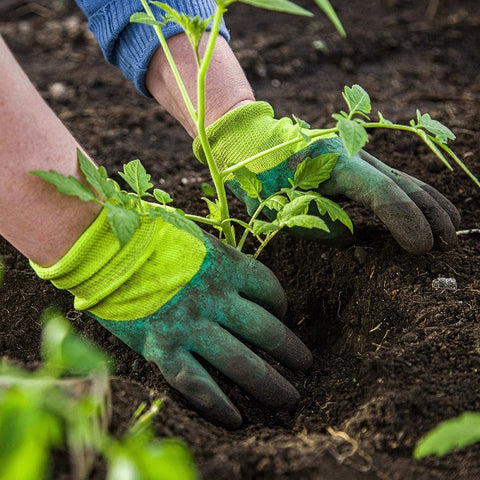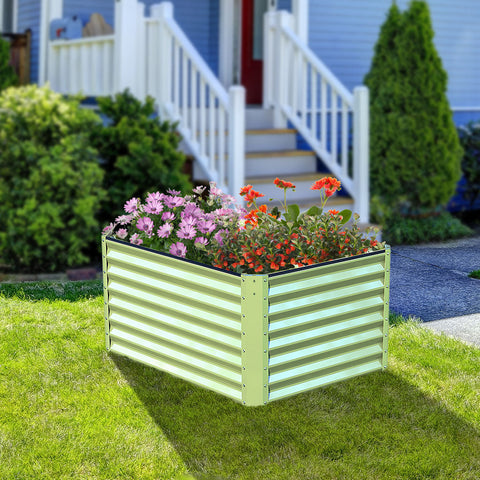As the sun gently kisses the horizon, and a soft breeze rustles through the leaves, your garden comes alive with the promise of a new day. Amidst the symphony of nature, your raised garden beds stand as a testament to your dedication and passion for growing healthy, thriving plants. Yet, amidst all the love and care you pour into your green haven, there's one crucial element that often takes center stage in the success of any garden: irrigation.The following content also has some reference value for raised garden beds.

In this comprehensive guide, we'll delve into the art and science of raised bed irrigation, uncovering the secrets to ensuring your plants receive the right amount of water at the right time. Whether you're a seasoned gardener or just beginning your horticultural journey, this exploration will equip you with the knowledge and tools to create an oasis of lushness and vitality within your own backyard.
Understanding the Importance of Proper Irrigation
Imagine a delicate dance between soil, roots, and water – a choreography that determines the health and vigor of your plants. Just as a dancer requires precise steps, your plants rely on well-timed and consistent irrigation to flourish. Proper irrigation:
- Nourishes Root Health: Adequate water supply ensures that plant roots have access to the necessary nutrients. This fosters strong root systems, enabling plants to absorb water and nutrients efficiently.
- Prevents Stress: Drought-stressed plants are more susceptible to diseases and pests. Proper irrigation helps maintain consistent moisture levels, reducing plant stress and vulnerability.
- Promotes Growth: An optimally irrigated garden encourages robust growth, resulting in healthy foliage, vibrant blooms, and bountiful harvests.
- Conserves Water: Efficient irrigation practices minimize water wastage, aligning with eco-friendly gardening principles and reducing your environmental footprint.
Choosing the Right Irrigation System for Your Raised Beds
The world of irrigation systems is vast, offering a range of options to suit various garden sizes, plant types, and personal preferences. Here are some popular irrigation systems that can work wonders for your raised beds:
1. Drip Irrigation: Precision at its Finest
Drip irrigation is a time-tested method that delivers water directly to the base of each plant. This efficient system minimizes water waste by ensuring that moisture reaches plant roots where it's needed most. Drip irrigation offers several benefits:
- Conserves Water: Drip systems reduce water runoff and evaporation, making them highly efficient in water usage.
- Prevents Foliar Diseases: Water is not splashed onto leaves, reducing the risk of fungal and bacterial diseases.
- Customizable: Drip systems can be tailored to each plant's water requirements, ensuring every plant receives the perfect amount of hydration.
2. Soaker Hoses: Gentle and Effective
Soaker hoses are porous hoses that ooze water along their length, providing a gentle and even distribution of moisture to the soil. They're particularly effective for flower beds, vegetable gardens, and plants with shallow root systems. Benefits of soaker hoses include:
- Uniform Watering: Soaker hoses deliver consistent moisture across the entire length, avoiding overwatering in some areas and underwatering in others.
- Water Conservation: Similar to drip irrigation, soaker hoses minimize water waste by targeting the soil directly.
- Ease of Installation: Soaker hoses are easy to set up, requiring minimal maintenance and allowing you to spend more time enjoying your garden.

3. Raised Bed Irrigation Kits: Tailored Convenience
Many gardeners opt for raised bed irrigation kits designed specifically for elevated growing environments. These kits often include a combination of drip lines, soaker hoses, and connectors to ensure hassle-free irrigation. The benefits of raised bed irrigation kits include:
- Simplicity: Kits are designed to fit raised beds seamlessly, providing a straightforward solution for consistent watering.
- Efficiency: By delivering water directly to the root zone, raised bed irrigation kits optimize water usage and minimize wastage.
- Time-Saving: These kits save you time and effort in designing and assembling your own irrigation system, allowing you to focus on nurturing your plants.
Best Practices for Raised Bed Irrigation
Armed with the right irrigation system, it's time to dive into the best practices that will make a world of difference in your garden's health and productivity:
1. Timing is Key
Watering in the early morning or late afternoon is ideal. This avoids the intense midday heat, which can cause rapid evaporation, and allows plants to absorb water effectively.
2. Observe and Adjust
Regularly monitor your garden's moisture levels and the condition of your plants. Adjust your irrigation schedule based on factors such as weather, plant growth, and soil type.
3. Mulch Magic
Apply a layer of organic mulch, such as straw or wood chips, around your plants. Mulch helps retain soil moisture, reduces weed competition, and contributes to a more stable microclimate.
4. Water Deeply and Thoroughly
When you water, aim for deep and thorough saturation of the root zone. Shallow watering can lead to weak root systems and surface-level dependency on moisture.
5. Incorporate Rain Sensors
Consider installing rain sensors in your irrigation system. These nifty devices detect rainfall and automatically adjust your watering schedule, preventing overwatering during wet periods.
6. Group Plants Thoughtfully
Arrange your plants in your raised beds based on their water needs. Group plants with similar moisture requirements together to ensure efficient irrigation.
Conclusion
As you embark on your journey to create a flourishing home garden, remember that raised bed irrigation is more than a routine task—it's an art that requires understanding, care, and precision. By choosing the right irrigation system, adhering to best practices, and investing in quality solutions, you're setting the stage for a garden that delights the senses and nurtures the soul.










